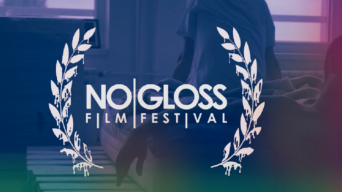
BY FRANCESCA LEWIS
Lesbian.com
Created by Trent Rampage in 2012, joined by Sophie Marfell the following year, No Gloss is a low-key, weekend-long event in the North of England showcasing quality films from all over the world, in a range of languages and genres. From shorts to features, from documentary to comedy to horror, No Gloss has everything. I spoke to the festival directors about their commitment to diversity and the need for more complex queer stories in cinema.
Can you tell me a bit about the inception of the festival – what is No Gloss all about?
Trent: The festival started out as an idea that I had back in 2012, to showcase low/no budget films in an accessible setting. Essentially, we wanted to create a platform for independent films, and introduce the idea to the audience that you do not need celebrity endorsements, massive budgets or the backing of major studios to create beautiful, powerful films. That it’s not all just about film-theory and “trying to achieve a certain style” or that one must follow a particular rulebook: the final output, because of the absence of restriction, allows filmmakers to create in their own unique way, so films become fun again: vivid, strange, wonderful, boundary-pushing – subjects, topics, characters rarely seen in the mainstream are brought to the fore. With this, we hope to inspire people who are interested in film-making and who want to learn about film-making to experience the festival in a positive way that motivates and encourages them to do so.
And that’s why our film festival is called No Gloss: no fancy shit, no frills, no celebrities – none of that. Just awesome films, a friendly vibe and you, the audience.
How does No Gloss serve diversity, inclusivity and themes like feminism?
Sophie: We serve diversity and inclusivity simply by selecting a diverse and inclusive range of films. Although mainstream cinema doesn’t currently reflect this, there are of course people from a wide range of identities and backgrounds making films, and it’s important that the work has a platform because they are fantastic films and the audience is there. We feel we have consistently managed to show a diverse programme, and are pleased that each year we seem to see more submissions from women and minority groups. We’re interested in the narrative of the film and the message that comes across, as all too often we see films where women, LGBTQ individuals and/or people from black and minority ethnic communities are used as props to a story or filling a negative stereotype. So yes, you may have a diverse cast, but is it an accurate and positive representation? That’s an important consideration in our selection process.
What about queer diversity specifically?
Trent: One of our personal favorites this year is Marzipan Flowers, a light-hearted, colourful and outrageous comedy feature about the almost “mother/daughter” relationship between a grieving widow and her new found friend, a troubled, fast-talking hard-partying transwoman. In Israel. That’s one brave, powerful film!
Sophie: Early on we had discussions about whether to have an LGBTQ section of the programme, or LGBTQ afternoon for example, but decided against it mainly because so often when you do that the majority of people who go along to that part of the event will be part of the LGBTQ community; which can be great for many reasons and is catered for by other festivals, but we prefer to keep the LGBTQ films in the main programme to ensure we are showing that positive representation to as wide an audience as possible.
I remember when I was younger how exciting it was to see the likes of Tipping the Velvet and Queer As Folk on mainstream TV, but also how annoying it was (and still is!) when pretty much every lesbian storyline on TV ends with one of them being killed off! We can counter that by providing a platform for positive examples of work.
Trent: Our programme is inclusive and our focus is broad. For us, we do not see the need to segregate “queer films” from “non-queer films” in our programme – they’re films, very good ones at that!
Francesca Lewis is a queer feminist writer from Yorkshire, UK. She writes for Curve Magazine and The Human Experience as well as writing short fiction and working on a novel. Her ardent love of American pop culture is matched only by her passion for analyzing it completely to death.






